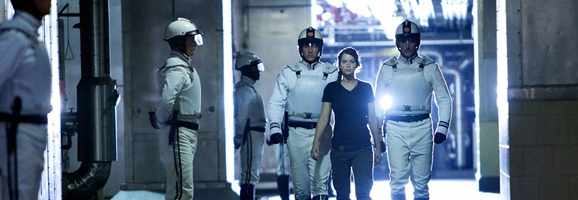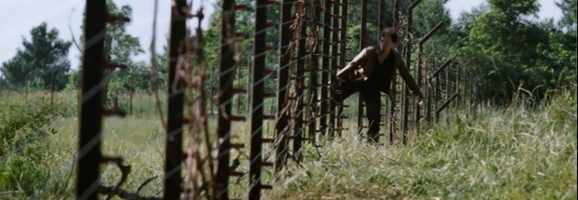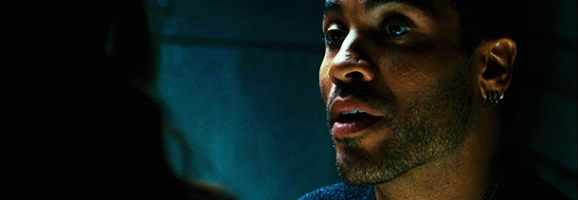The Hunger Games: Five Things That Helped to Bring The Capitol Down

Fate has long been viewed by many as a controlling force in the world, always keeping its thumb on things, assuring that events take place as expected and are following a certain path leading towards a particular end. Literature has always been a place where the idea of Fate is discussed and applied. Fate causes empires to crumble, epic heroes to fall, and travelers to traverse the long, winding road home. One example in literature where fate is most certainly at work is the first installment of The Hunger Games series. While Katniss finds herself tumbling down the rabbit hole of revolution, what is actually at play is a series of very particular events, one leading to the next, that facilitates the downfall of The Capitol. Here are fives ways in which fate plays a significant role in The Hunger Games.
5. Lack of Perimeter Security in District 12

Katniss Everdeen was not born a killer. She was not born a hunter or a gatherer or anything else that should be happening outside the bounds of District 12. All of these qualities were facilitated by a gross negligence towards perimeter security in District 12. Regarding the fence meant to both keep out predators and keep in citizens, Katniss notes that the fence is “supposed to be electrified twenty-four hours a day” but that because they rarely have electricity supplied to District 12, the fence is “usually safe to touch.”
Katniss was often taken beyond the perimeter of District 12 by her father when she was a child. It was there in the woods outside their Appalachian community that she began to learn the skills that would serve her so well in the arena later in her life. He taught her to hunt, how to gather, what was edible and what would kill you. Once her father died, Katniss continued the practice and sharpened her skills to a deadly quotient. She became revered for her skills with a bow, as Peeta notes when he says that “My father buys her squirrels. He always comments on how the arrows never pierce the body. She hits every one in the eye. It’s the same with the rabbits she sells the butcher. She can even bring down a deer.” The lack of perimeter security around the district helped to form Katniss into a woman more than capable of handling herself in the arena.
4. Peeta Mellark is Selected as Tribute

Perhaps one of the most important things that happens in the Hunger Games is the fact that Peeta Mellark is chosen to represent District 12 in the 74th Hunger Games with Katniss. Peeta plays a very significant role for Katniss throughout the series, but particularly during the first games. His bubbly, loveable attitude and winning smile serve as a juxtaposition to Katniss’ stoicism and reservedness. Often times it is Peeta that carries the pair when the public eye is at its most scrutinizing. Katniss possibly would have found herself in a much different situation than she did had she been paired with anyone else, especially someone that did not understand to such a high degree how the Hunger Games really work.
Peeta is a public relations maven. He knows just when to say exactly what needs to be said, how to pull at the strings of the citizens of The Capitol. He creates and spins the story about his love for Katniss (not that it is orchestrated), he turns the young “couple” into something the people can believe in, and, most importantly, Peeta provides the kindling and ignites the first spark for what would become The Girl on Fire. It is because of Peeta that Katniss ever really had a chance once the going got tough in the arena.
3. Cinna is Selected to be the Stylist for Katniss

Katniss is described as being a fairly plain young woman. There is nothing particularly spectacular about her, and she comes from a District where is it not considered important, or feasible for that matter, to live a life very conducive to being “pretty.” When she volunteers as tribute, she comes to The Capitol as a young and innocent girl from the hills of Appalachia and looks the part. Her team of stylists seem to have quite the difficult time simply preparing her to meet with Cinna for the first time. However, once he comes onto the scene, things begin to open up for Katniss.
One of the most important decisions that Cinna makes it to veer away from the standard practice of dressing up the tributes as one of the traditional workers from their district. Normally tributes from District 12 are dressed as coal miners, which is the primary job in that particular district. Cinna, however, decides to go in a slightly different direction, dressing Katniss and Peeta up as pieces of coal and adding a little touch of razzle dazzle by allowing their costumes to give the appearance of being on fire, such as a burning piece of coal would look. This move immediately throws both tributes into the spotlight and makes Katniss the most desirable tribute in The Capitol. Cinna also makes some very important wardrobe and behavioral decisions for Katniss that help to shape her public persona before the Games began, endearing her to the audience and giving them a reason to believe in her. Without the assistance of Cinna, considering everything he does for Katniss before his departure in the second book, Katniss more than likely would not have been nearly as successful in the arena. Had she had any other stylist, perhaps they would have treated Katniss and Peeta the same as any other stylist and dressed them as workers as usual. More than likely, had that been the case, she would have been the cause for cannon fire long before the games were over.
2. The Arena

There is one very important aspect to the arena that played a major part in Katniss being successful: It was basically her back yard. Readers and viewers are given glimpses of what the different arenas have been like. Some are like a wintery region. Some are more like deserts. Some, like in Catching Fire, are set up like a tropical environment. The 74th Hunger Games, however, seemingly places Katniss back beyond the fences of District 12 where she hid from the prying eyes of The Capitol and honed her skills as a tracker, hunter, and gatherer. These skills learned at home directly correlate to the first arena she is presented with and the fact that it was so similar to her home was a distinct advantage to her.
More than likely not many other tributes were very familiar with a terrain such as that which is given in her first Hunger Games. Many of them are from regions near water, or flat lands, or lands with more rocky terrain. Katniss, however, feels very much at home in this arena and she is able to capitalize on that comfort by reacting to situations and going about her way of playing the games just as she would were she stalking the woods of District 12. Had the arena been a desert, or something else completely different from that which she is accustomed to, there is a good chance that she would have not survived the Games. Granted, she does see an arena much different in Catching Fire, but the situation is completely different and she has multiple allies that are constantly making sure that she makes it out of the arena at any cost. Had The Capitol only chosen any different type of arena for this particular Hunger Games, things may have turned out quite differently for President Snow.
1. Foxface Eats the Berries First

One of the real twists of fate in The Hunger Games comes near the end of the Games after Katniss has finally nursed Peeta beck to well enough health to leave the cave they have been hiding in for quite some time. As they make their way through the woods Katniss goes off to hunt and leaves Peeta to gather some other things for them to eat. As she is off she realizes that it has been some time since she has heard from Peeta recently, he is not returning her whistles. When she arrives at the spot where she left him, he is nowhere to be found. She rushes around, eventually finding him picking berries by a stream. Katniss takes a moment to look at the berries and then realizes, at the same time she hears a cannon boom go off, that these berries are not for consumption. When Peeta is still standing they are initially confused, but then see Foxface being lifted from the woods.
Foxface is one of the craftiest tributes in the Games. She effectively makes it almost to the very end simply by sneaking around and quietly stealing whatever she needs. This, as it turns out, was her downfall. She snuck up on Peeta and stole some of their food, including the berries which led to her demise. Were it not for Foxface trailing Katniss and Peeta, it is more than likely that Peeta, being a somewhat simple person with almost no knowledge of the natural world, would have certainly eaten the berries and been killed. This would have set off a chain of events that would have led to Katniss dying much sooner than later. Considering her skill, there is still a chance that she could have made it out of the arena if she was able to get over the fact that she would have just watched Peeta die right before her from eating poisonous berries. However, over the course of the narrative, there is no way that Katniss could have survived without Peeta. As Gale says in Mockingjay, “Katniss will pick whoever she thinks she can’t survive without.”

Over the course of all three novels, there are many instances that could be viewed as fate intervening. These are just some of the instances from the first novel. However, it is clear that all of these instances were integral in the fall of The Capitol. Had one of the things been different, such as something being selected aside from Peeta or if there was a completely different arena, things might have turned out completely different in Panem. Generally speaking, looking at fate in literature can seem like an obvious and useless endeavor. However, it is interesting to look at how events play themselves out and imagine what could have happened had this or that had gone differently. Suzanne Collins left no shortage of moments of fate throughout the series, and if we choose, have many different ways of imagining her world under different circumstances where things were different.
What do you think? Leave a comment.











Who knew… with a skilled writer they might be able to make a good film out of a weak book. I’m going to step on a few toes here perhaps, but I thought the book of Girl with the Dragon Tattoo was quite a clunker – an ok story but badly paced and with some quite excruciating dialogue and an author who hasn’t quite sussed out his own characters – however the most recent film I really enjoyed. Actually, all the best things about the film were things they’d changed from the book. I know if you go changing things from the source material you’ll always get outrage from the fans, but I think it is possible to make a film that improves upon the original novel.
I haven’t read the book and probably never will, and I can’t really trust anyone’s opinions on how good something’s writing is, but my friends have told me that the Hunger Games books are decent. I did enjoy the film for what it was.
I found the ending of Mockingjay a bit weak. Too banal: dousing the devil and erecting the new world on the ashes of the past– happy endings all around. I suppose the surprising and horrific ending in Catching Fire just couldn’t be topped. Mockingjay should have ended with ambiguity: Katniss is hardly an angel of light, but even angels of death cannot mete justice. Pres Coin must survive to pay the ferryman to convey her debt across the Styx. Katniss lives despite her willingness to commit suicide at the close of The Hunger Games. Should ultimate altruistic traits persist? Isn’t that the real question, here? What if Katniss makes another sacrifice? What if she trades her life for Prim’s as she did in the first novel? Is the circle complete?
In real life isn’t it the Abrahams, Martins, and Johns who are ferried across the void? Our fascination with martyrs and their ability to inspire should be retained in the world of YA Lit.
For YA Lit, The Hunger Games Trilogy was not too bad. Recommended, even if the third installment is a tad weak. Even I could have written a better ending.
To be honest, I found The Hunger Games film adaptation to be pretty mediocre: rehashing the same tired old dystopian future story and going the Battle Royale route without exploiting it to its full potential. Plus, cheap production design, ideas and settings stolen from other, better movies, obnoxious shaky-cam and cinematography, and terrible CGI. Good actors, yes, and it remains passably entertaining, but just runs circles around its core subject matter.
As for the books, the second isn’t as good as the first, and the third installment is downright underwhelming. Sorry, this ain’t gonna be a series I remember for very long.
And as for splitting the final chapter into two films, that’s just a lazy excuse to squeeze more money out of the franchise. To use a tired example, with 2001: A Space Odyssey, Stanley Kubrick went from the dawn of man to the birth of the starchild, a story spanning millions of years – and he did that in two and a half hours, plus an intermission. For pity’s sake, Mockingjay’s plot could be told in ninety minutes, let alone a two hour plus feature length.
As far as splitting a book into two movies goes… it’s pretty much always a $$ grab but whether it’s forgivable or not IMO depends on the book. I gave Potter a pass because despite their valiant efforts to keep the other doorstopper tomes in the series down to one film a piece Deathly Hallows was much harder to cut. You really couldn’t have trimmed much else out without skipping over entire sections of plot necessary exposition and action pieces, it’s all so tied in together that extracting subplots would’ve meant taking a hatchet to it. Breaking Dawn, however? That thing is hundreds of pages of inaction and introduction of characters who then don’t go on to do much, it did not need two movies.
The third book is dreadful, I was so disappointed when it got to the whole ‘the capitol is booby-trapped… Just like the HUNGER GAMES ARENA, eh reader?!’ bit. Character motivations were confused, and key events were rendered confusingly, in contrast to the sharp and concise writing of the first book. I wanted Collins to be braver and write the story of the Panem revolution without retreading tired conceits. I thought it was great how a book ostensibly for teens was leading its readers into what I thought was going to be a great political satire on revolt and the media, but Collins drops the ball big time.
Interesting that you think Mockingjay the weakest, most people I know feel that way about Catching Fire which suffers slightly from ‘middle book syndrome’.
Mockingjay does take a while to get going and is a very different type of book (being about war rather than a single game) but I wouldn’t call it weak
I just finished Mocking Jay and agree it is the weakest book of the trilogy. I barely made it through MJ and only did so because it was the last book and I wanted to see what happened to Peeta.
The whole trilogy is weak. The writing is cliched and contrived, the characters are flat, and their motivations and actions are unbelievable. Having said this, the trilogy is entertaining beach material, excepting the final installment which was painful to finish. Collins suffers from an affliction affecting many a writer: not knowing how to end a story. Mockingjay felt like one long, drawn out goodbye.
It’s a tendency I’ve noticed that with young adult books (I’m 20 now so I rarely read them anymore, maybe writing styles have changed) that they often frequently recapitulate events, as if teenagers struggle to remember a plot.
The third book was great! It had a far stronger focus on the rebellion, and the ending was quite controversial, but I liked those aspects of it.
The third book is definitely the weakest!
I completely agree! The third book was terrible and I barely made it through. I liked the first one the best, the second one was all right. By the time I got to the third book, I was basically thinking “seriously?” throughout the whole thing.
I completely agree that Mockingjay was the weakest of the trilogy. My main issue with the novel, you know other than the fact that many of the events in the Capitol seem rather arbitrary (such as the death of main characters which make the premise of the novels a moot point – without saying names in case some of you are waiting for the film), is that it felt like Collins knew she was only writing a trilogy and only had certain amount of pages to work with. I felt as if it was very rushed and didn’t fully explain why things were happening or even enough of what was going on after the Capitol fell. Similar to how I felt about the Epilogue of Harry Potter.
Don’t get me wrong, I’m happy Katniss and Peeta “won,” – in a very loose sense of the word – but it would have been nice to get some kind of information about what had happened between the fall of the Capitol and “Real / Not Real.”
My main issue with Mockingjay is the focus on the love triangle- I don’t feel like it is really adding anything to the story at this point. The whole romantic sub-plot seems like it has been shoe-horned in.
*Spoilers Below*
I have to disagree. Love wasn’t thrown in for love’s sake, I think that sub-plot is important because it adds a layer to the mythology of the world Collins has invented. How does someone find love in a world that is so cruel? In this dystopian world, people are only able to find love with those in their districts. However, ultimately, Katniss finds love the right way – she marries the person she has that special connection with. Love wasn’t shoe-horned in. It was an important element in Panem culture.
I enjoyed your article! It appears that Fate is as prevalent in literature as it is in real life. I could look to the past in my life and imagine where I would be if I had turned left instead of right. It was smart of you to discuss this in the pretense of, currently, such a hot title in pop culture.
I enjoyed the read!
Great article. Love how it started off, with a seemingly irrelevant detail.
Great article! I like how you point out the important parts of the novel that were absolutely necessary for the rebellion. When reading the books it is easy to get caught up on Katniss and Peeta and the role they play and forget about how a lot of the success of the rebellion relied on other factors.
The details have mostly vanished from my memory, but I still recall feeling that it was ridiculous the way she contrived to turn the capital city into a Hunger Games style arena with booby traps on every street corner.
I read the first book but didn’t care enough for the story or the style to continue. I’ve read up on the arc of the trilogy, though.
One thing I hope (but doubt) is that audiences will get the true radicalness of it all–the tyranny and exploitation that exists in many regimes, not just the cartoony extreme of Panem.
I fear it will be lost on the average reader/viewer, especially if it is moderated in the movie version.
I just completed my thesis capstone project on dystopia in American literature with a feminist subtext. I spoke a lot about the Hunger Games and how Katniss’s femininity ultimately brought down the Capitol. Throughout the series she was given male qualities such as hunting skills and a role as “leader of the family.” When it came down to actually fighting, the uprising came into form by Katniss’s love relationship with Peeta. She won over the Capitol and became “girl on fire” because of her femininity.
Hey! So I totally agree, these things are majorly important, but the point of fiction is that the author crafts a story so it fits together and tells a tale, one that they wish to tell. So yes, nothing in any novel could happen without the details in it. I just don’t see the point of this article. See, you seem to summarize and tell what’s already known. I feel like you could go so much deeper into this series. People are going to say well I didn’t like it or I don’t like the writing. Okay well, if they can’t provide examples to back up their opinions then they are just that: opinions. Make it an argument, make it controversial, make it passionate. These comments mainly just say wow the movies are boring and these books are poorly written. Your article does not do much to add to the series, you simply state things that are known. And so I suppose I am just confused is all, but I do love that someone has taken interest in the Hunger Games 🙂 Goood luck with your MA!
I feel so bad whenever I read the books because I am just thinking about how I would have quelled the revolution! It’s just me, shaking my head, thinking about assassination. I suppose its a sort of interactivity? You should see me with Harry Potter!
No apologies needed for natural human tendencies.
I enjoyed your article. Though you focused on the topic of fate, it was a bonus to read a synopsis of the first book. It made me remember how much I loved it.
As a Hunger Games fan I enjoyed this read. I think toying with the topic of fate and imagining different outcomes given different circumstances and situations was a great theme to tie into the novel. I think you should have included the poverty in her district as being an advantage too. Food is scarce in District 12 and we see this almost immediately (part of the reason Katniss is usually out hunting beyond the perimeter). In the arena she is at an advantage over other districts, such as the Careers who are used to extravagance, in that she can withstand a good amount of time without having eaten much. Nice article!
I loved your analysis and insight into the entire Hunger Games enigma. Peeta’s selection was definitely a turning point in the novel, as his personality perfectly juxtaposed that of Katniss. As for the arena, Katniss definitely had an advantage in the first games, but in the second the arena was more jungle-like and her natural hunter abilities were somewhat overshadowed.
Your article makes several good points. I hadn’t considered before that the forest arena of the 74th Hunger Games would be that much of an advantage for Katniss (and therefore also for Peeta). Though, as pointed out previously, Katniss was able to hold her own throughout the 75th Hunger Games as well dealing with a more jungle like atmosphere. In my opinion, she probably would have been able to adapt to most climates and terrains simply because her hunter’s mindset would be telling her one thing, “Survive.” Or in the words of Haymith, “Don’t die.”
I feel like the biggest contributing factor to Katniss surviving (possibly tied with her incredible skill with a bow and arrow) was Peeta being chosen as the male tribute. Peeta knew how to work a crowd and how to be the calming yin to Katniss’s very irritable yang. No one would have cared about what happened to the Girl on Fire if Peeta hadn’t made her desirable and worth paying attention to. Can you imagine if Katniss had been put into the games with Gale? Sure, he’s much more skilled when it comes to survival but he is just as uncharismatic – if not more so – than Katniss. Haymitch would have had no chance of gaining them sponsors or viewer sympathy. The pair may have been able to survive the other tributes, but if no sponsor would send them a balm they could have succumb to hypothermia or a simple infection (as Katniss almost did). District 12 would not have had their second ever champion, and more than likely the rebellion would not have taken off like it did.
Simply put, Katniss needed Peeta.
And how about in the very beginning, the fact that it was her sister’s name that was drawn out of the bowl? I think, despite horrible odds?
I wonder whether Collins did this on purpose (the similar backyard/arena, that Peta is so much better liked etc)or whether it was a sub-conscious action.
Great food for thought. It makes me want to go back and study the books!
I think you did a great job of highlighting Peeta’s importance in the Hunger Games. PR maven nails his character.
I hate myself for saying this, but I actually enjoyed the movies more than the books. The books have terrible foreshadowing seconds before the foreshadowed event happens and the movies are probably a better medium for telling the story.